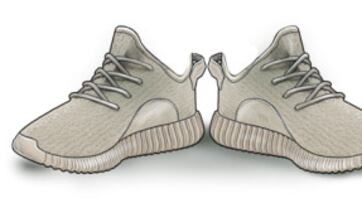Last week, LMVH Luxury Ventures, an offshoot of Paris-based conglomerate LMVH that owns dozens of luxury brands like Louis Vuitton, Christian Dior and Dom Pérignon, invested an undisclosed amount in New York-based sneaker and streetwear reseller Stadium Goods. Though it's common knowledge in Portland that there's money in athletic shoes, this investment makes plain what a lot of people who pay attention to the high-end sneaker market have been tracking for the past few years: Reselling sneakers is big money now.
And with big money comes big fraud.
In 2017, Happy Valley's James Pepion pleaded guilty to federal charges of trafficking in counterfeit goods and money laundering after being busted with 1,600 pairs of counterfeit shoes in his house in 2016. Bank records showed Pepion had paid about $175,000 for shoes imported from China, while PayPal records revealed he'd received more than $2.6 million since opening in 2012.
Take a trip to Old Town sneaker reseller Index and you'll see walls of rare Air Jordans, Yeezys and other sought-after shoes that resell for hundreds of dollars more than their retail price. Many pairs run well into four figures; a handful—such as the black and silver Air Jordan "Carhartt 4" collaboration between Nike, Carhartt and rapper Eminem—break five.
"The sneaker game has evolved from where it came from a few years ago, where it's really mainstream now," says Mike Nguyen, co-owner of Index. "There's a lot of money to be made, and wherever there's money, there's going to be fakes. We see it at least once or twice a day."
Nguyen and his business partner Terrance "Tee" Ricketts tell WW that the quality of fraudulent sneakers has markedly improved in the past few years, coinciding with the enormous boom in popularity of fashion sneakers following the introduction of Adidas' Yeezy collaboration with Kanye West in 2015.
"There are a lot of different dynamics to it," explains Tee, "but we see shoes every day to the point where we know what to look for. It's not just one thing we look at, because the people who are making the fakes are perfecting their craft as well."
Using a pair of "Blue Tint" Yeezy Boost 350 V2s that Tee and Nguyen keep "deadstock" (trade lingo for unworn)—they have an unworn pair of every shoe in the Yeezy line in store for reference—they break down where and how fraudsters make mistakes with counterfeit pairs. In short, a mistake can be made in any part of the sneaker.
Which is why Index checks every part, including packaging materials, labels, insoles, the receipt and even the smell of the shoes (real Yeezys smell faintly of cardboard). With fraudulent shoes, mistakes are very frequently made in the spacing, lettering and font size on labels and tags in the shoe. Savvy scammers will even include authentic accessories, such as packaging materials or laces, with fake shoes to throw buyers off.
Unfortunately, there is no easy way for someone looking to buy a pair of shoes from a reseller online to guarantee they're getting the real thing, but there are a few precautions that can be taken.
"If the price is too good on a hot shoe, and they have multiples, and it's way below market, just walk away," says Tee. He further advises buyers to use the fraud-protected PayPal as the payment service and, if possible, to go with sellers that have good reputations.
Even better, go to Index, where they'll professionally "Legit Check" your shoes for free, even if you aren't buying anything from them, offering Portland's sneakerheads a safe space for commerce and trading. With thousands of hours of experience, they're the best resource for sneaker authenticating in the city.
"We've been doing this for 12 years plus, just authenticating sneakers," says Tee. "We've seen people cry before, where they've spent thousands of dollars on a sneaker, and we have to tell them it's not authentic. We take this extremely seriously."
GO: Index, 114 NW 3rd Ave., 503-208-3599, IndexPDX.com. Instagram: @indexportland. Noon-7 pm Monday-Saturday, noon-5 pm Sunday.
